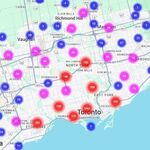I kind of missed your point too. Perhaps a short summary?
What you demonstrate is the inability for many to understand the regs as written, and the unwillingness to read them to realize that Metrolinx themselves are possibly violating their own Bylaw with UPX service premium charges to/from the airport for persons travelling into or out of Toronto the use of ML services at the rate GO themselves charge. The implication from this Bylaw is that a de-facto RER already exists in the Georgetown Corridor to and from the airport as that pertains to GO passengers crossing into or out of Toronto. Perhaps you fail to understand that UPX is part of the "Corporation"?
[...]
4. When a passenger travels on the transit system from a point outside the City of Toronto to another point outside the City of Toronto, and can only do so by travelling through the City of Toronto by means of more than one transit service provided by the Corporation, the following rules apply in determining the total fare payable: (a) If there is more than one transit service available between the passenger’s point of departure and the City of Toronto or between the City of Toronto and the passenger’s destination point, the fare payable for each transit service shall be the lowest fare available for the trip, regardless of which transit service the passenger actually takes.
[...]
@mdrejhon understands it. Others have in the past, although this is the first time I'm aware of the regs supporting the case. If anyone has a different interpretation of what it indicates, then by all means post it.
That indicates that taking a GO bus from say, Brampton to the airport, and then transferring to UPX to continue to ride to Union and out to say, Pickering, the premium fare UPX charge for the Weston to Airport segment is not applicable.
And in fact, even further interpretation of the clause indicates not even having to travel through Toronto for the "cheapest fare" but *to* or *from* Toronto, including by UPX via the Airport.
If there is more than one transit service available between the passenger’s point of departure and the City of Toronto or between the City of Toronto and the passenger’s destination point, the fare payable for each transit service shall be the lowest fare available for the trip, regardless of which transit service the passenger actually takes.
The term "Corporation" I specifically made clear in my first post on the subject as being defined by Metrolinx as *themselves*.
It's right at the top of the first page of the Bylaw:
https://www.gotransit.com/static_files/gotransit/assets/pdf/Policies/By-Law_No2A.pdf
The irony of this is that from the wording ML themselves state, this is already a SmartTrack manifestation of RER, the present failing being the last link from Weston to the Airport, where by ML's own wording, for 'overhead' passengers travelling from in or out of Toronto via the airport must match the lowest GO (ML) price for travelling *around the airport* (bypassing it).
In other words, in my case or any others' having to travel to/from Bloor Station to Square One for instance, where UPX is used to travel via Union Station for the regular GO fare, the same "lowest fare" must be matched if travelling via the Airport, which is much more direct and saves approximately an hour let alone being more reliable and less demanding physically.
Here is a possible exception, albeit it doesn't initially appear to meet the terms necessary to exclude UPX premium fares from the prior quoted section:
premium fare 2.10
Where more than one transit service is provided between two places by the Corporation, a local transit system, or a combination thereof, the Corporation may charge on any such service operated by it a premium fare and the amount of the premium fare shall be set out on the Corporation’s public website (
www.gotransit.com).
That's an interesting clause in itself. If it pertains to the former quoted clause, then the interpretation necessary for it to be presents ML with a conundrum to satisfy "the fare payable for each transit service shall be the lowest fare available for the trip, regardless of which transit service the passenger actually takes."
Post Script July 8: Discussing this with a few others, and considering the timeline of the slow merging of UPX into GO Transit, and the Bylaw quoted being from Metrolinx (and an amalgam of the two branches' Bylaws), it's probable that UPX could have legally upheld the premium fare clause before that merger began.
I suspect that the politically motivated merger to try and correct a very flawed business model has produced a tariff that is an attempt to reconcile two different and not fully compatible modes of transit. Nothing demonstrates that more than the ridiculousness of still running two ticketing systems complete with separate Presto machines, and the fare anomaly between Weston and the Airport.
It's time to fold UPX completely into GO now the process has started, and to rewrite sections of the Metrolinx Bylaw and Tariff to eliminate conflicting clauses.
What could Metrolinx possibly be scared of? That the route would be even more popular? And where's Dougie being for "the People" and "the Folks" on this? Is this still a service for the elite on the taxpayers' dime, or should it be for all who need to connect through on GO Transit?
And what if it becomes so popular that it 'crams' airport travellers? Besides adding more service ( an obvious move albeit electrification would be necessary, so get on with it), the affected elites would just be paying regular GO fares per distance, and if they feel 'crammed'...they can take Uber.




